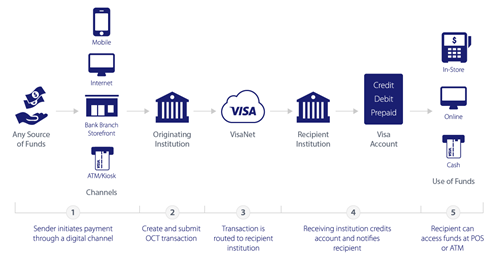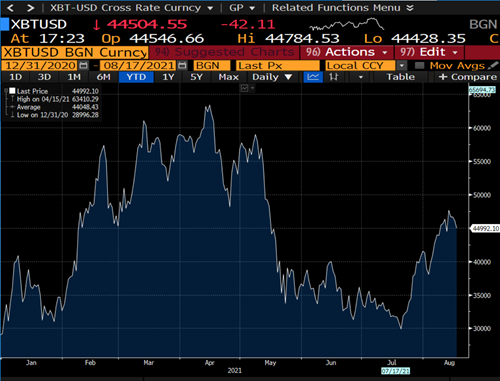Cryptocurrency: Too Volatile for Your Pension
With recent remarks by SEC chair Gary Gensler asserting the position that the U.S. will seek more regulatory authority over the burgeoning digital currency space, we at New Frontier thought it important to review for advisors our reasoning for why Bitcoin and other cryptocurrencies do not meet New Frontier’s criteria for inclusion in risk-managed accounts.
Since inception of our ETF portfolios in 2004, New Frontier has consistently included only the best quality, cost effective, transparent, ETFs in our investment universe. Also, as a multi-patent holding investment firm founded on academic and practitioner-tested principles of asset management, we monitor the ETF space and take special notice of relevant innovations. This year, we hosted a series of guest lectures that included research on long-term performance of equities, defining ESG for asset management, as well as research on cryptocurrencies and blockchain technologies.
In our most recent lecture aimed at curious investment professionals who may not already be experts in blockchain technology, Professor Antoinette Schoar, Stewart C. Myers-Horn Family Professor of Finance and Entrepreneurship at the MIT Sloan School of Management, spoke about cryptocurrency and its current limitations from an investor’s perspective. Her presentation had three main points, effectively summarizing New Frontier’s rationale for excluding Bitcoin from its portfolios:
A Vehicle for Monetary Transactions
First, Bitcoin is far too slow and inefficient to function effectively as a payment mechanism, and is at odds with New Frontier’s use of ETFs which by definition can be traded in real-time. Three reasons for this are:
- The median time for bitcoin transactions to clear and become visible on the blockchain, the official ledger of Bitcoin transaction, is ten to fifteen minutes. By comparison, a credit card such as Visa can clear such transactions nearly instantaneously.

- Mining, the process that effectively does the work of clearing the transaction and updating the ledger, is rewarded with Bitcoin, in coins. However, the ledger will disappear once the limit of bitcoins has been reached, and owners of bitcoins will have to pay an additional fee to process further transactions.
- The activity of transacting coins, including mining operations, is tremendously inefficient and consumes a sizable portion of global energy consumption, far more than more traditional currencies. This level of consumption is unsustainable, especially if cryptocurrencies were to replace traditional currencies and scale up accordingly in transaction volume.
A Store of Value
Second, Bitcoin is far too volatile to function as a store of value for ordinary investors as:
- A few individuals own most of the coins in existence, and they can easily manipulate the exchange rate between dollars and coins to suit their purposes.
- Bitcoin is subject to a high degree of price impact, making it far less suitable for ordinary investors as a store of value than, for example, the U.S. dollar, the Euro, or even gold.

A Speculative Investment
Finally, the only remaining narrative by process of elimination is that Bitcoin, and other cryptocurrencies function primarily as a speculative investment, as:
- Bitcoins do not represent an investable asset class with a stable risk premium, which is a necessary feature for inclusion in non-speculative portfolios like retirement funds or individual investment accounts.
- New Frontier’s portfolios are all long-term optimized, and an asset as unstable as Bitcoin is nearly impossible to reliably optimize over time. Although our process can handle some amount of uncertainty, estimating expected return, standard deviation, or correlations with other assets for Bitcoin could result in wildly different values depending on the historical window, and the only way to stabilize those estimates would be to effectively guess their values, which goes against our rigorous evidence-based process.
These three arguments perfectly illustrate why Bitcoin, and by extension cryptocurrencies, are not suitable vehicles for risk-managed investment products such as New Frontier’s: namely that they are not suitable vehicles for retirement or estate accounts. While not excluding the possibility of improving some of these issues through future innovations, or finding other applications for blockchain technology, these clear explanations align well with our thinking about Bitcoin, and give a precise argument as to why we don’t consider it an investable asset class.
Disclosures:
Past performance does not guarantee future results. As market conditions fluctuate, the investment return and principal value of any investment will change. Diversification may not protect against market risk. There are risks involved with investing, including possible loss of principal. The indices are not investable securities. Any investable security would have performance reduced by fees and expenses. Any distribution must comply with your firm’s guidelines and applicable rules and regulations, including Rule 206(4)-1 under the Investment Advisers Act of 1940.
Locate Us
New Frontier Advisors
155 Federal Street
Boston, MA 02110
617.482.1433
Contact us to find out how you can invest in New Frontier portfolios.